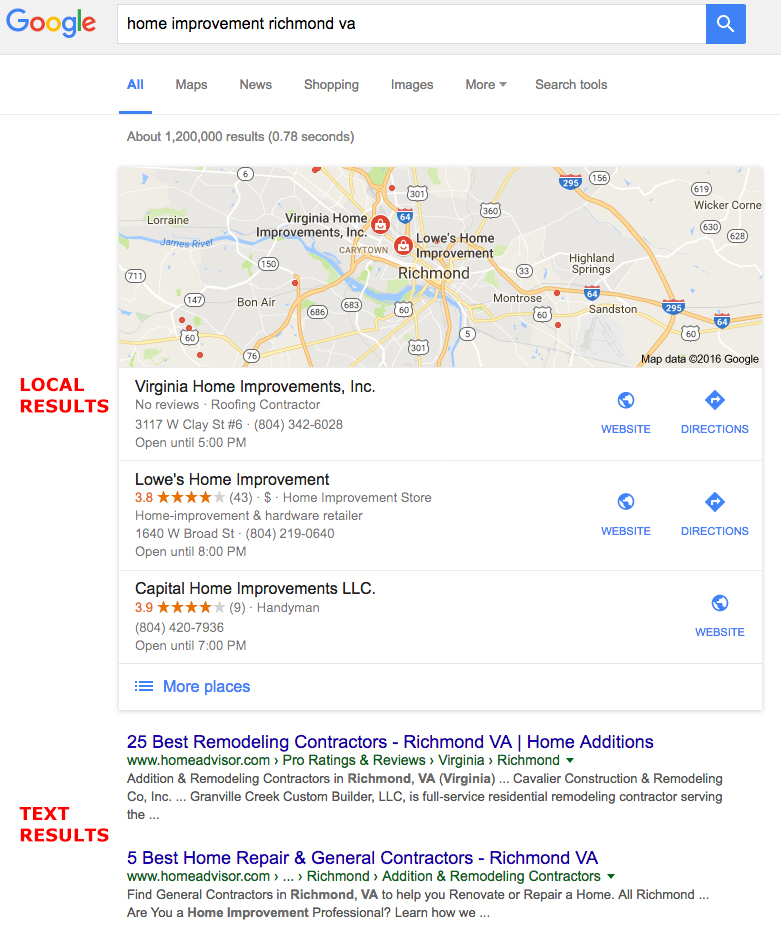
Having strong search rankings requires thorough planning, strategy and flawless execution. Google looks at over 200 factors when ranking content and the markup, site structure, user experience and content of a website all play a role in how a particular website ranks in search.
When looking at SEO for organizations with multiple locations this can become infinitely more complicated from a technology and optimization standpoint. However, when planning out how to ensure locations rank in search there are a few major areas to consider.
What Exactly is Local SEO?
- Local Search Engine Optimization (SEO) is the process of optimizing a website to garner results in Google’s Local Results
- Google will return “local results” when a geographic location is added to a search
- For instance: “home improvement Richmond Va” will return local results because this search is aimed at finding something within a specific geographic area
Why Optimize Your Site for Local SEO?

- Google (and other search engines) factor in location data when displaying search results.
- People tend to include cities/states/regions when searching for locations on the web.
- In some cases when a location is added to a search query, location results will out rank text results.

- 51% of smartphone users look for local information while on the go.
- 50% of local-mobile searchers are looking for business information like a local address.
Site Structure Tips: Where should location pages reside?
Single Domain
Although it might require additional resources or planning up front the benefits of having all locations under one domain are numerous.
1. Having all content and locations on one site creates a stronger index and connectivity in Google’s eyes.
2. Locations would inherit authority from a main domain which will help improve Google rankings.
3. Google prefers location specific pages.
4. Having all content on one domain will compound marketing and link building efforts.
5. Easier content syndication and utilization of canonical urls on duplicate content.
6. Ability to optimize content globally on one domain.
7. Personalized and localized content will be easier to manage.
8. Enhanced user experience and brand experience.
Why Not Separate Domains?
It might be easy to spool up a new website from a CMS but in the long run having separate websites for each location isn’t beneficial from an SEO standpoint.
9. Each site is indexed separately by Google meaning each site competes with one another making strong rankings a challenge.
10. Links would need to be built to each page on each website.
11. No domain authority is inherited from a main domain to outside domains.
12. Content optimization and creation would need to occur for each page on each site.
13. Duplicate content concerns.
14. Cross domain canonical urls can be challenging.
15. Reciprocal links pose no real SEO benefit. Especially if all sites are on the same server.
16. Functionality and user experience could vary from site to site.
Onsite/Landing Page Local SEO Tips
17. Each location will need its own url/landing page.
18. URLs should contain location/geographic data.
19. On page content needs to be unique to each location.
- Location specific body content, heading tags, page titles, meta descriptions etc.
20. Structured data for local business should be implemented.
- Minimum of name, address and phone number on each location page.
21. Google Map showing location with “get directions” function.
22. Testimonials, ratings, reviews and accreditation’s should be prominent.
23. Mobile friendly website.
Offsite Local SEO Tips
24. Claim location/business profiles (aka “citations” in the SEO world).
- Google, Yahoo, Bing, Yelp, Superpages and City Search to get started.
- Each business location will need to be claimed separately.
25. Consistent Name, Address and Phone number structuring on each of the above citations.
26. Consider a service like Yext or Whitespark to claim, maintain and grow citations.
27. Enhance citations with photos and content.
28. Try to obtain local links back to local pages on the website.
29. Local content and promotion strategy.
Who’s Doing it Right
- Home Depot
- Body Logic MD
